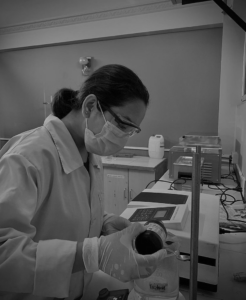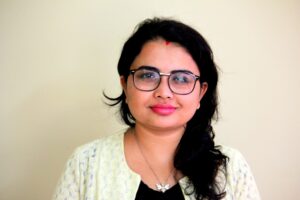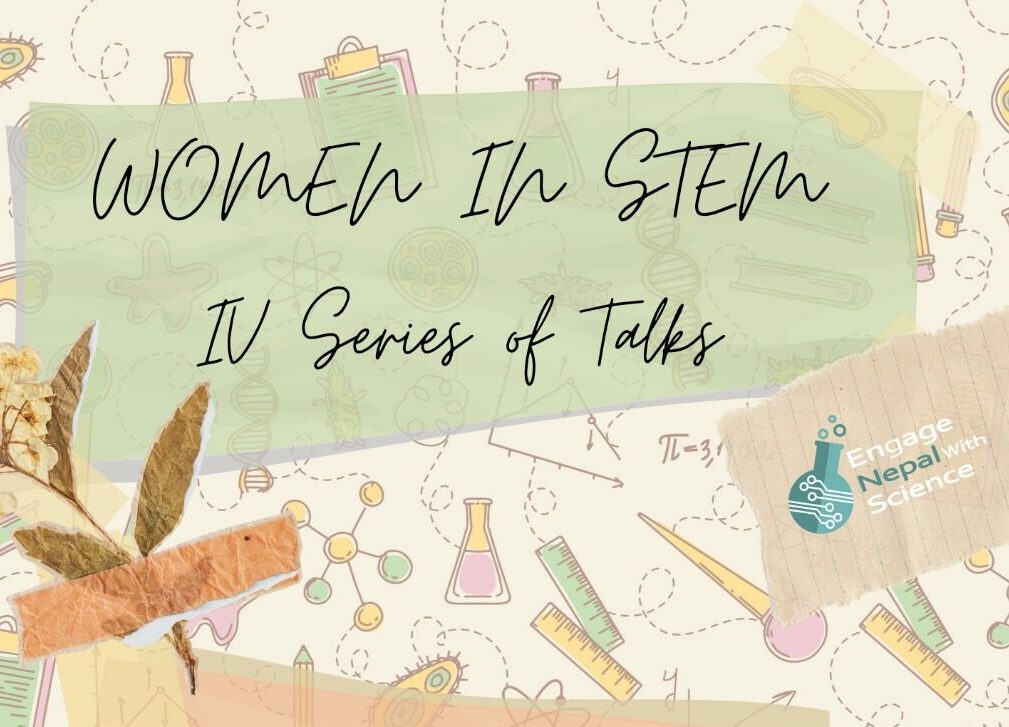Women in STEM series IV
Our really successful series of online talks aim to celebrate the role of women working in different fields in STEM while inspiring young minds.
The line up of speakers for our Women in STEM series IV was:
Thursday 13th June: Andreia Wendt – 9 am UK time/1.45 pm Nepal time
Friday 21st June: Monima Karmacharya – 9 am UK time/1.45 pm Nepal time
Thursday 27th June: Susma Giri – 9 am UK time/1.45 pm Nepal time
Friday 5th July: Sushila Maharjan – 12 pm UK time/4.45 pm Nepal time
Free registration.
Please find more information about the speakers below:
 Andreia Wendt studied (BSc) Applied Chemistry (Biotechnology) and later Biochemistry in the Faculdade de Ciências e Tecnologias, Universidade NOVA de Lisboa (UNL). Obtained her Master´s degree in Biomedical Sciences (Molecular Biology and International Tropical Medicine) in the Instituto de Higiene e Medicina Tropical (IHMT), UNL, specializing in the field of Leishmania parasites. She graduated (PhD) from the Medical School of Hannover in 2018 where she focused on glycan modifications of TSRs in C. elegans and Toxoplasma gondii proteins. As a Marie Curie postdoctoral fellow she joined the Sir William Dunn School of Pathology, University of Oxford, where she first started exploring the function of transporter proteins in the biology of Leishmania parasites using CRISPR/Cas9 gene editing. She then moved to Glasgow, as a postdoctoral Research Associate at the Welcome Centre for Integrative Parasitology at University of Glasgow, continuing the functional dissection of the Leishmania transportome in this parasites’ life cycle using BARseq strategies. Currently, Andreia is a member of the Vector Borne Diseases group of the Global Health and Tropical Medicine Centre, hosted by IHMT-UNL and an advanced postdoc at the Institute of Cell Biology at the University of Bern.
Andreia Wendt studied (BSc) Applied Chemistry (Biotechnology) and later Biochemistry in the Faculdade de Ciências e Tecnologias, Universidade NOVA de Lisboa (UNL). Obtained her Master´s degree in Biomedical Sciences (Molecular Biology and International Tropical Medicine) in the Instituto de Higiene e Medicina Tropical (IHMT), UNL, specializing in the field of Leishmania parasites. She graduated (PhD) from the Medical School of Hannover in 2018 where she focused on glycan modifications of TSRs in C. elegans and Toxoplasma gondii proteins. As a Marie Curie postdoctoral fellow she joined the Sir William Dunn School of Pathology, University of Oxford, where she first started exploring the function of transporter proteins in the biology of Leishmania parasites using CRISPR/Cas9 gene editing. She then moved to Glasgow, as a postdoctoral Research Associate at the Welcome Centre for Integrative Parasitology at University of Glasgow, continuing the functional dissection of the Leishmania transportome in this parasites’ life cycle using BARseq strategies. Currently, Andreia is a member of the Vector Borne Diseases group of the Global Health and Tropical Medicine Centre, hosted by IHMT-UNL and an advanced postdoc at the Institute of Cell Biology at the University of Bern.
 Monima Karmacharya is a B.Tech Biotechnology graduate currently working as a Research Assistant at Research Institute for Bioscience and Biotechnology (RIBB). Her research areas are microbiology and molecular biology specially focused in Lactic Acid Bacteria (LAB), which are prevalent in Nepal’s traditional fermented food products and livestock milk. Through RIBB, she is also actively involved in Engage Nepal with Science and has already delivered a number of workshops. In her talk, she will talk about her experiences as a kid, how she got into STEM, her hobbies, and her future goals. She will also discuss what she is currently working on and explain the science behind certain foods.
Monima Karmacharya is a B.Tech Biotechnology graduate currently working as a Research Assistant at Research Institute for Bioscience and Biotechnology (RIBB). Her research areas are microbiology and molecular biology specially focused in Lactic Acid Bacteria (LAB), which are prevalent in Nepal’s traditional fermented food products and livestock milk. Through RIBB, she is also actively involved in Engage Nepal with Science and has already delivered a number of workshops. In her talk, she will talk about her experiences as a kid, how she got into STEM, her hobbies, and her future goals. She will also discuss what she is currently working on and explain the science behind certain foods.
 Dr. Susma Giri is a distinguished ecologist specializing in insect responses to climate change, biodiversity conservation in the Himalayas, and environmental pollution. She is a founding member of Kathmandu Institute of Applied Sciences (KIAS), Nepal, where she currently serves as the Scientist and Director of Research. With over 15 years of research and teaching experience, she has led numerous initiatives and collaborations aimed at conservation and ecosystem management. Susma is also a founding member and current treasurer of the Organization for Women in Science for the Developing World – Nepal Chapter, demonstrating her commitment to gender equality and the advancement of women in STEAM fields . With her proficiency in using R programming for data analysis, Susma has led several R training workshops. Upon completing her doctorate studies in Ecology from the University of Wyoming, USA, Susma returned to her home country, Nepal, and has been working to make a better research environment since then. She is always committed to knowledge sharing and motivating new generation of students.
Dr. Susma Giri is a distinguished ecologist specializing in insect responses to climate change, biodiversity conservation in the Himalayas, and environmental pollution. She is a founding member of Kathmandu Institute of Applied Sciences (KIAS), Nepal, where she currently serves as the Scientist and Director of Research. With over 15 years of research and teaching experience, she has led numerous initiatives and collaborations aimed at conservation and ecosystem management. Susma is also a founding member and current treasurer of the Organization for Women in Science for the Developing World – Nepal Chapter, demonstrating her commitment to gender equality and the advancement of women in STEAM fields . With her proficiency in using R programming for data analysis, Susma has led several R training workshops. Upon completing her doctorate studies in Ecology from the University of Wyoming, USA, Susma returned to her home country, Nepal, and has been working to make a better research environment since then. She is always committed to knowledge sharing and motivating new generation of students.
 Dr. Sushila Maharjan is an Instructor in Medicine at Harvard Medical School (HMS) and Associate Bioengineer at Brigham and Women’s Hospital (BWH). Before joining HMS, Dr. Maharjan was a postdoc fellow at laboratory of Biomedical Polymers and Tissue Engineering at Seoul National University, Korea. She received her Ph.D. in Biochemistry from Sun Moon University (Korea), Master’s degree in chemistry and Bachelor’s degree in Biological Sciences, both from Tribhuvan University (Nepal). Her current research is focused on cutting-edge biofabrication techniques like 3D bioprinting and microfluidic organ-on-chip systems to develop engineered tissues that mimic the anatomical, and physiological/pathophysiological traits of human tissues, with potential applications in disease modeling, drug discovery, and regenerative medicine. Dr. Maharjan is a Founding member of Research Institute for Bioscience and Biotechnology
Dr. Sushila Maharjan is an Instructor in Medicine at Harvard Medical School (HMS) and Associate Bioengineer at Brigham and Women’s Hospital (BWH). Before joining HMS, Dr. Maharjan was a postdoc fellow at laboratory of Biomedical Polymers and Tissue Engineering at Seoul National University, Korea. She received her Ph.D. in Biochemistry from Sun Moon University (Korea), Master’s degree in chemistry and Bachelor’s degree in Biological Sciences, both from Tribhuvan University (Nepal). Her current research is focused on cutting-edge biofabrication techniques like 3D bioprinting and microfluidic organ-on-chip systems to develop engineered tissues that mimic the anatomical, and physiological/pathophysiological traits of human tissues, with potential applications in disease modeling, drug discovery, and regenerative medicine. Dr. Maharjan is a Founding member of Research Institute for Bioscience and Biotechnology
(RIBB), a pioneering public funded research institute in Nepal and an initiative member of Engage Nepal with Science.

